As a former preschool director and a graduated preschool parent, I’ve picked up some wisdom through the years to help parents of preschoolers prepare their child and themselves for this momentous occasion. Sending your child to preschool for the first time is both exhilarating (FREEDOM!!) and frightening. Here are my top 10 tips of what to do and expect when starting preschool:
-
Once your child is enrolled in a program, you will fill out all the necessary paperwork. Pay particular attention to the program’s policies. Many programs require an immunization record as proof of your child being inoculated. If you have religious or health reasons for not having your child immunized, talk to your program administrator prior to the start of school. Many programs no longer accept religious exemptions so make sure you aren’t left out before the year ever starts.
-
Most programs offer a parents’ open house so that you can meet your child’s teacher and see their classroom prior to the start of school. You will also find out important information about policies, practices, and schedules. Make a list of questions and ask the administrator anything that you are concerned about. This is also a perfect time to discuss allergies or any medical conditions that your preschool staff needs to be aware of.
-
On the first day of school, most programs expect parents to walk their child into their classroom. This is great for the first day or first week of school, but after that, drop off should happen in the carpool line or outside the classroom. On the first day, be loving but firm. Hug and kiss your child, tell him you’ll see him after school (being specific is good for some kids—“at 1 o’clock”), and let him walk in. Do NOT go into the classroom, and don’t linger. The longer you stay before leaving, the sadder your baby will become.
-
Label all of your child’s supplies, from lunchboxes and backpacks to lovies and jackets. There are so many cute personalized labels now that there’s really no reason not to label everything! (This former director is a big fan of monograms!) And while you might assume your child’s unicorn lunchbox is the only one in the room, you would probably be wrong. There are often multiple children with identical items so labeling everything is the best way to ensure your items don’t go home with the wrong child. Most programs also ask that you send a full change of clothes (with shoes) to keep at school in case of accidents. I suggest putting them in a gallon-sized Ziploc bag with your child’s name on the outside of the bag (it’s also a good idea to label the individual items in the bag).
-
Most programs will ask you to send diapers for children who aren’t potty trained. In my experience, it’s easiest to buy a large supply and label them with your child’s name so that you don’t have to remember to send them each day. The teachers will alert you when the supply is running low.
-
The first day of preschool is not the time to try to wean your child away from his pacifier or favorite blanket. While he is growing up and attending his first program, these items can give comfort in an unfamiliar environment. There’s always time for the pacifier to go to the paci fairy, but during this adjustment period, comfort items are okay (in fact, encouraged).
-
Communicate with your child’s teachers. Let them know if anything out of the ordinary is going on (teething, late night, especially fussy). Let them know if your child will be out and if anyone other than you will be picking your child up. You can always send notes in your child’s bag although most teachers will give you their email addresses and cell numbers so that you can text or email. Many places even have Remind groups or GroupMes for classroom communication.
-
Don’t freak out when (it’s usually when not if) your child is bitten or bites. Biting is a common phase for preschool-aged children. For kids who haven’t fully developed their verbal skills, it’s a form of communication. And remember, you don’t see 5th graders biting each other, so it’s not something that persists. But it does happen and is really no cause for alarm. Of course, use it as a teachable moment—tell your child firmly that he should be gentle with his friends and that teeth are only for chewing food. Discuss appropriate disciplinary action with your preschool administrator so that there is consistency at school and at home. If your child is on the other end of a bite, the staff will alert you. Understand they can’t tell you the identity of the biter (that’s just standard privacy policy). Check to see if the skin was broken and make sure the bite mark is clean. It’s typically a blip on the radar for kids.
-
Sickness will happen. If your child has been at home with you, chances are he hasn’t been sick much. But once he starts school, the germs are inevitable. Remember, kids this age put everything in their mouths, including other people’s pacifiers or even fingers—so germs can spread quickly. If your baby is sick, keep him home. The rule is 24 hours fever free WITHOUT medication before returning to school. And while fevers with teething are occasional, most likely if your child has a fever, it’s not teeth. If your child has a loose, runny diaper, a tummy bug might be germinating, so better to be safe than sorry. If your child has something more contagious (Hand Foot & Mouth, flu and Fifths Disease are a few), let the program administrator know immediately so other parents can be notified.
-
When it’s time to potty train, make sure to inform your preschool staff and work out a plan of action. Make sure the teachers know how you plan to potty train (are you using pull-ups or going straight to big kid underwear?). Make sure your child is dressed in clothes that allow him to easily potty—for instance, overalls aren’t meant for potty trainers. Usually, elastic waistbands are best. Be patient if your child has accidents at school. Potty training at home with individual attention is much easier than at school with a class of 10 or more. They will catch on. And don’t rush it. Typically if a child is pushed to potty train before he is ready, he will rebel. There are usually natural cues that tell you your child is ready to potty train.


